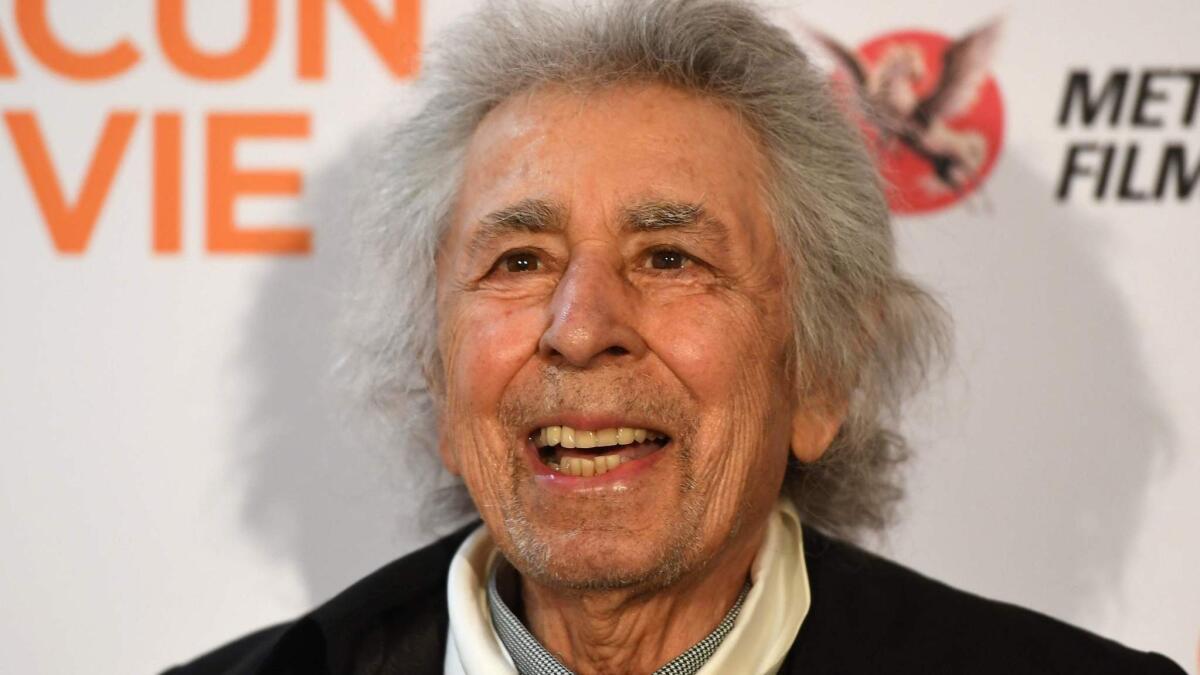Francis Lai, Oscar-winning film composer of ‘charming seductiveness,’ dies at 86

- Share via
Francis Lai, who won an Academy Award for his heart-tugging musical score of the blockbuster 1970 movie “Love Story” and composed the music for more than 100 films — including the 1966 French hit “A Man and a Woman” — died Wednesday in Nice, France. He was 86.
His death was announced by the mayor of Nice, Christian Estrosi. The cause was not disclosed.
Lai began his musical career as an accordionist and accompanist to the renowned French chanteuse Edith Piaf. He was primarily a songwriter before being introduced to filmmaker Claude Lelouch, who invited Lai to compose a score for “A Man and a Woman” — and for an additional 35 films on which they worked together.
At a time in the 1960s and early 1970s, when the Vietnam War, student unrest and rock music were upending global culture and film, Lai composed movie soundtracks that were unabashedly romantic and melodic.
“His music was not just beguiling, but it conveyed a charming seductiveness,” film music historian Jon Burlingame said. “There was something sexy about it.”
The slender plot of “A Man and a Woman” revolved around two widowed parents — a film assistant played by Anouk Aimee and a racecar driver played by Jean-Louis Trintignant — who fall in love after being brought together by their children, who attend the same school. The film, shot in black and white, includes scenes of auto racing, walks on the beach, all-night drives in the rain and breathless reunions of the two central characters.
“A Man and a Woman” received decidedly mixed reviews, but audiences couldn’t get enough of the film’s romantic yearning. It shared the grand prize at the 1966 Cannes Film Festival.
Lai’s music was an essential part of the film’s underlying emotional pulse.
His musical style owed a great deal to traditional French music, jazz and bossa nova, but he also sometimes wrote in an imitation-classical style or experimented with synthesizers and other electronic instruments. He always composed at night.
He wrote the soundtracks for Terence Young’s “Mayerling” (1968), René Clément’s “Rider on the Rain” (1970) and the 1978 equestrian movie “International Velvet,” with Anthony Hopkins and Tatum O’Neal. His other credits included music for the soft-core pornography movies “Emmanuelle II” (1975) and “Bilitis” (1977); in all, Lai’s soundtrack albums sold more than 20 million copies.
Because he did not speak English and seldom left France, he had limited exposure in Hollywood before “Love Story,” a 1970 film directed by Arthur Hiller and based on a blockbuster novel by Erich Segal.
Lai twice turned down offers to work on “Love Story.” He was finally persuaded by French actor Alain Delon, who flew to Paris with Paramount studio head Robert Evans to show Lai a rough cut of the movie.
“I came out of the screening incredibly moved,” Lai said in a statement to the Los Angeles Times in 2001. “I went straight home, sat at my keyboard and wrote that theme that very night.”
The haunting score, much of it played on piano, deepens the heart-tugging quality of the movie, which featured Ali MacGraw and Ryan O’Neal as college lovers. “Love Story” was nominated for seven Oscars, but the only one it won was for Lai’s score.
The soundtrack album reached No. 2 on the Billboard charts. Andy Williams’s vocal version of the theme song, “Where Do I Begin?” — recorded after the film was made, with lyrics by Carl Sigman — was a Top 10 hit.
“The tune itself has an inimitable sadness to it,” Burlingame said. “There’s something romantic and melancholy, and if you combine them, deeply emotional — which makes him perfect for film.”
Francis Albert Lai was born April 26, 1932, in Nice. His parents were gardeners who sold produce. A cousin taught him to play the accordion, and he later learned the piano.
After moving to Marseille, France, he became an accompanist to singer Claude Goaty and a devotee of jazz. He later followed Goaty to Paris, then became part of Piaf’s circle. He worked as her accompanist and wrote about 600 songs, some of which were performed by Piaf, Juliette Greco and Yves Montand.
Survivors include his wife of 50 years, Dagmar Puetz; and three children.
More to Read
Start your day right
Sign up for Essential California for the L.A. Times biggest news, features and recommendations in your inbox six days a week.
You may occasionally receive promotional content from the Los Angeles Times.






